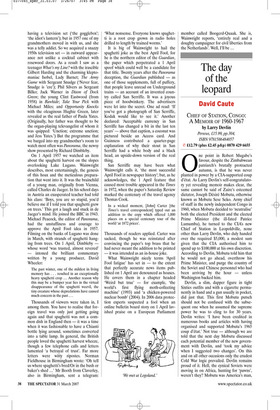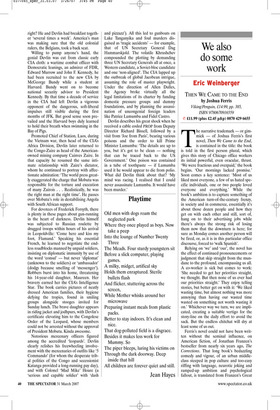The day of the leopard
David Caute
CHIEF OF STATION, CONGO: A MEMOIR OF 1960-1967 by Larry Devlin Perseus, £15.99, pp.304, ISBN 9781586484057 ✆ £12.79 (plus £2.45 p&p) 0870 429 6655 One point in Robert Mugabe’s favour, despite the Zimbabwean patriarch’s brutally protracted autumn, is that he was never planted in power by a CIA-supported coup d’état. As Larry Devlin’s self-congratulatory yet revealing memoir makes clear, the same cannot be said of Zaire’s esteemed dictator, Joseph Désiré Mobutu, otherwise known as Mobutu Sese Seko. Army chief of staff in the newly independent Congo in 1960, when Mobutu decided to ‘neutralise’ both the elected President and the elected Prime Minister (the ill-fated Patrice Lumumba), he turned to the CIA’s new Chief of Station in Leopoldville, none other than Larry Devlin, who duly handed over the required $5,000, a modest sum given that the CIA authorised him to spend up to $100,000 at his own discretion. According to Devlin, Mobutu told him that he would not go ahead, overthrow his Prime Minister, and purge the country of the Soviet and Chinese personnel who had been arriving by the hour — unless Washington backed him.
Devlin, a slim, dapper figure in tight Sixties outfits and with a cigarette permanently in hand and a gun usually in pocket, did just that. This first Mobutu putsch should not be confused with the subsequent one when he assumed the supreme power he was to cling to for 30 years. Devlin writes: ‘I have been credited in numerous books and articles with having organised and supported Mobutu’s 1965 coup d’état.’ Not true — although we are told that the next day Mobutu discussed each potential member of the new government with Devlin, and ‘took my advice when I suggested two changes’. On this and on all other occasions only the crudest Cold War logic prevailed. Devlin remains proud of it. Hell, the cynical Soviets were moving in on Africa, hunting for ‘pawns’, weren’t they? Mobutu was America’s man, right? He and Devlin had breakfast together ‘several times a week’. America’s man was making sure that the old colonial rulers, the Belgians, took a back seat.
Willing to pump anyone’s hand, the genial Devlin was cut from classic early CIA cloth: a wartime combat officer with Democratic leanings, an admirer of FDR, Edward Murrow and John F. Kennedy, he had been recruited to the new CIA by McGeorge Bundy while a student at Harvard. Bundy went on to become national security advisor to President Kennedy. By that time a decade of service in the CIA had left Devlin a vigorous opponent of the dangerous, soft-liberal impulses still visible during the first months of JFK. But good sense soon prevailed and the Harvard boys duly learned to hold their breath when swimming in the Bay of Pigs.
Promoted Chief of Station, Laos, during the Vietnam war, then head of the CIA’s Africa Division, Devlin later returned to the Congo-Zaire as head of the Americanowned mining company Cainves Zaire. In that capacity he resumed the same intimate relationship with Zaire’s dictator, whom he continued to portray with affectionate admiration: ‘The world press greatly exaggerated the charge that Mobutu was responsible for the torture and execution of many Zairois . . . Realistically, he was the right man at the right time’. He passes over Mobutu’s role in destabilising Angola with South African support.
For devotees of Frederick Forsyth, there is plenty in these pages about gun-running in the heart of darkness. Devlin himself was subjected to Russian roulette by drugged troops within hours of his arrival in Leopoldville: ‘Come here and kiss my foot, Flamand.’ Speaking his essential French, he learned to negotiate the endless roadblocks manned by unpaid soldiers, insisting on diplomatic immunity by use of the word ‘consul’ — but never ‘diplomat’ (unknown to the soldiers) or ‘ambassador’ (dodgy because smelling of ‘messenger’). Robbers burst into his home, threatening his 14-year-old daughter, Maureen. Her bravery earned her the CIA’s Intelligence Star. The book carries pictures of neatly dressed American families, their hygiene defying the tropics, found in smiling groups alongside stooges invited for Sunday lunch. The brave daughter appears in riding jacket and jodhpurs, with Devlin’s certificate elevating him to the Congolese Order of the Leopard, whose members could not be arrested without the approval of President Mobutu. Kinda awesome.
Notorious mercenary officers figured among the accredited ‘leopards’. Devlin clearly relishes his freewheeling involvement with the mercenaries of outfits like ‘5 Commando’ (for whom the desperate tribal politics of the Congo and secessionist Katanga provided a long-running pay day), and with Colonel ‘Mad Mike’ Hoare (a ‘serious and capable soldier’ with ‘dash and pizzazz’). All this led to gunboats on Lake Tanganyika and foul murders disguised as ‘tragic accidents’ — for example, that of UN Secretary General Dag Hammarskjold. The volatile Khrushchev compounded the plotting by demanding three UN Secretary Generals all at once, a Western candidate, a Soviet-bloc candidate and one ‘non-aligned’. The CIA lapped up the outbreak of global Jacobean intrigue, assuming the role of master playwright. Under the direction of Allen Dulles, the Agency broke virtually all the legal limitations of its charter by funding domestic pressure groups and dummy foundations, and by planning the assassination of uncongenial foreign leaders like Patrice Lumumba and Fidel Castro.
Devlin describes his great shock when he received a cable coded PROP from Deputy Director Richard Bissell, followed by a visit from ‘Joe from Paris’, bearing various poisons and the order to kill Prime Minister Lumumba: ‘The details are up to you, but it’s got to be clean — nothing that can be traced back to the US Government.’ One poison was contained in a tube of toothpaste — if Lumumba used it he would appear to die from polio. What did Devlin think about that? ‘My mind was racing. I realised that I could never assassinate Lumumba. It would have been murder.’











































































 Previous page
Previous page